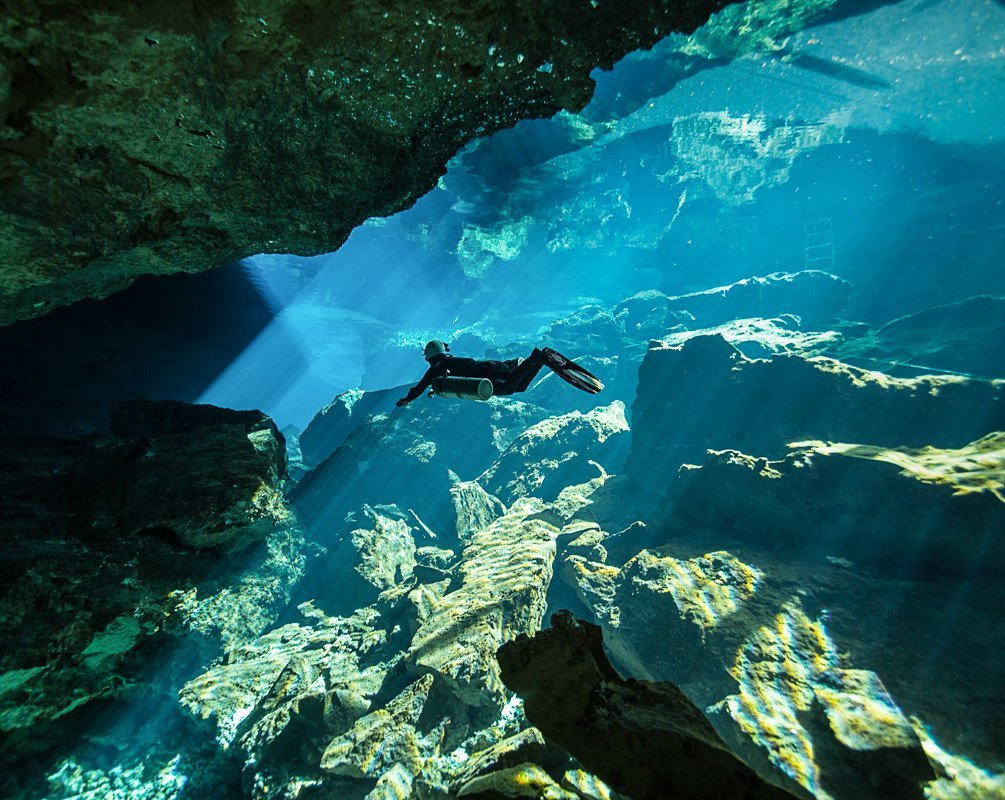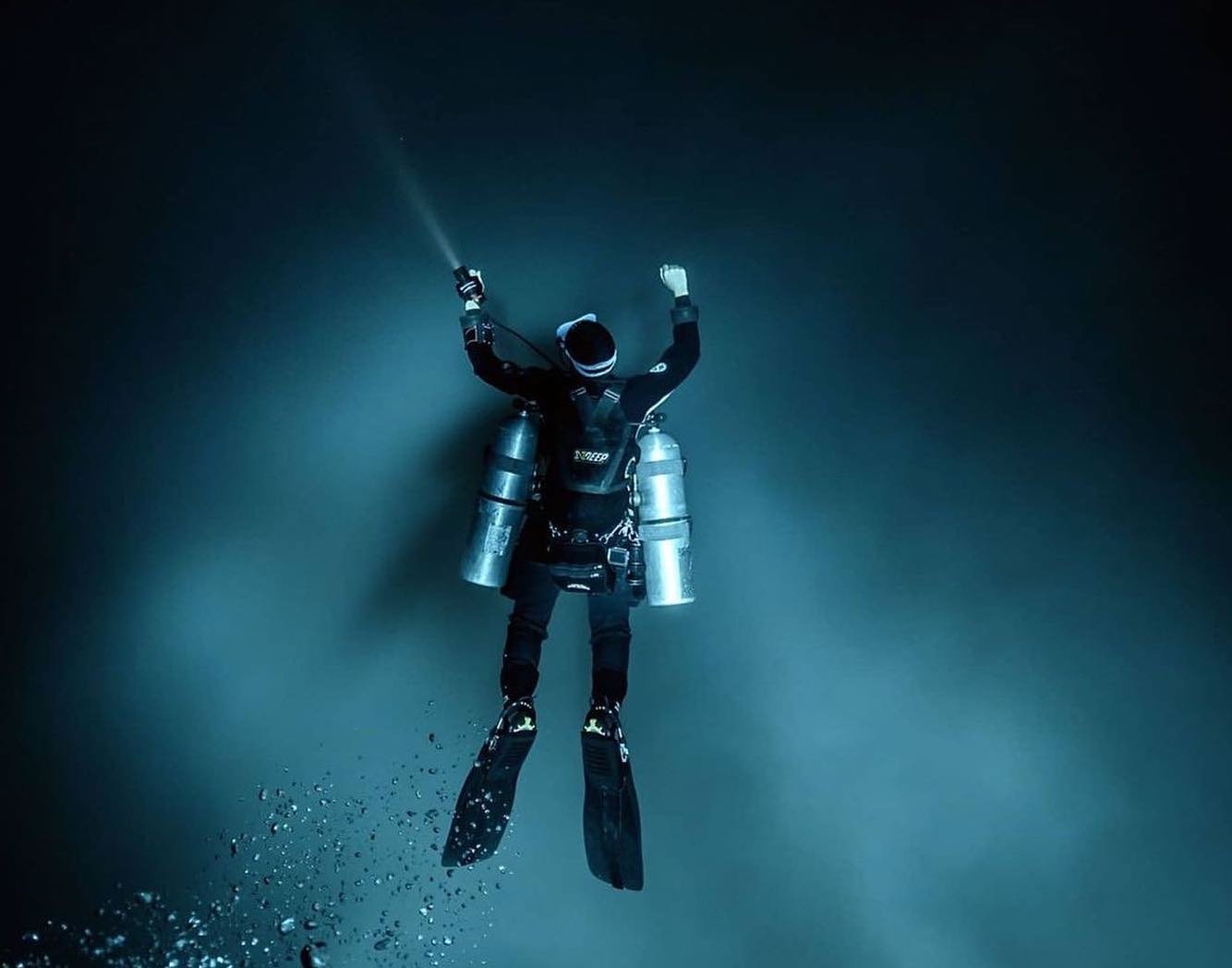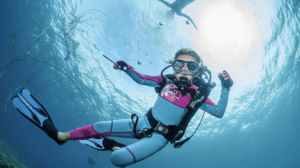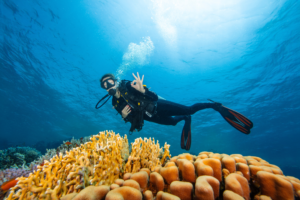Thinking about exploring the secrets of the underwater world? Before delving into the deep blue, make sure you’ve got more than just your diving gear; you’ll need a diving certification.
Whether you’re buying or renting diving equipment, both local and international stores often require this diving certification. However, in certain diving destinations, more advanced certifications might be necessary to explore their waters fully.
Content:
- PADI (Professional Association of Diving Instructors)
- NAUI (National Association of Underwater Instructors)
- BSAC (British Sub Aqua Club)
- CMAS (Confédération Mondiale des Activités Subaquatiques)
- SSI (Scuba Schools International)
- Which diving agency to choose?
- PADI and YDC
Recreational diving isn’t centralized under a single certification agency or regulation, leading to a diversity of organizations and diving schools offering various certifications.
However, obtaining a certification involves enrolling and completing courses in open waters, where you gain knowledge, skills, and valuable experience in the fundamental principles of diving. These certification agencies consist of highly trained and certified instructors who share their expertise with diving enthusiasts.
They not only offer training programs at various levels but also regulate the industry, representing teachers, instructors, and other diving professionals. Additionally, they actively engage in medical research related to diving, promote marine conservation, and spread the passion for diving as a sport.
Here are the most prominent diving certification agencies worldwide:
1. PADI (Professional Association of Diving Instructors)
PADI stands out as the leading diving certifier globally, established in 1966 by two diving instructors, John Cronin and Ralph Erickson.
Operating in 186 countries and territories, PADI boasts a global network of over 6,600 dive centers and resorts and more than 128,000 professional members worldwide.
PADI started in response to the need for more consistent and accessible training standards. Its innovative modular approach revolutionized diving instruction, allowing students to learn at their own pace.
Their programs range from beginner levels like “Scuba Diver” and “Open Water Diver” to advanced certifications like “Master Scuba Diver.”
PADI’s educational system is structured in modules with standardized learning objectives, combining theory and practical skills.
Knowledge assessment is guided by instructors, while practical skills are developed in confined environments and open-water assessments at the end of each course.
PADI issues over 1 million certifications annually and has provided more than 29 million certifications to date, enabling people worldwide to seek adventures and ocean conservation through underwater education.
PADI offers a wide variety of certifications, including:
- Open Water Diver
- Advanced Open Water Diver
- Rescue Diver
- Master Scuba Diver
- Divemaster
- Adaptive Support Diver
- Adventure Diver
- Scuba Diver
- Assistant Instructor
Check out the complete catalogue of PADI certifications here.
2. NAUI (National Association of Underwater Instructors)
NAUI has a illustrious history. It’s the oldest among those listed here, founded in 1959, setting the standard for certification programs since then.
Unlike other diving organizations, NAUI hasn’t expanded as much. Its main headquarters are still in California, USA, though it has other centers across the country. However, its presence in other countries isn’t as prominent.
NAUI is a non-profit organization. In fact, it’s officially registered as a non-profit educational association. Simultaneously, this agency has a very distinct philosophy based on quality over quantity.
That’s why they prefer to train a few divers but ensure they know what they’re doing. Training too many people, from their perspective, would reduce the attention each requires.
Their diving courses are very similar to those offered by PADI and hold the status of being the second-largest diving certification agency globally.
NAUI boasts several famous industry pioneers who’ve been certified, such as Jacques-Yves Cousteau, “the father of diving,” Kevin Costner, Tiger Woods, Cameron Diaz, and many more.
Some of NAUI’s popular certifications include:
- Try Scuba/Passport Scuba
- Tandem Scuba Diver
- Scuba Diver
- Enriched Air Nitrox (EANx) Diver
- Advanced Scuba Diver
- Rescue Scuba Diver
- Master Scuba Diver
- First Aid Provider
- Night Diver
- Deep Diver
- Divemaster
- Underwater Imaging
- Public Safety Diver
For more information on NAUI’s wide range of courses and certifications, click here.
3. BSAC (British Sub Aqua Club)
Established in 1953 and headquartered in the United Kingdom, BSAC is the largest diving club globally. With over 50,000 members, it’s been recognized as the official recreational diving body in the UK.
BSAC operates through 1,600 independent local diving clubs and over 400 diving schools worldwide. Since the UK waters are relatively cold with limited visibility, BSAC’s training emphasizes rescue skills from the early stages of the program.
Choosing this certification if you live in the UK is a good idea due to BSAC’s high recognition in the area. While its training is known for high quality, BSAC doesn’t enjoy as much international fame as PADI.
Some of BSAC’s popular certifications currently include:
- Ocean Diver
- Sports Diver
- Dive Leader
- Ice Diving
- Advanced Diver
- First Class Diver
Click here to see the complete list of BSAC certifications.
4. CMAS (Confédération Mondiale des Activités Subaquatiques)
CMAS is a non-profit institution and is famous because one of its founders was Jacques-Yves Cousteau. Founded in the Monaco Congress in 1959, its original purpose was to support diving development and unify educational standards across different countries where it operates.
In recent decades, CMAS has expanded its operations globally and now regulates diving in more than 130 countries. To achieve this, it works directly with each country’s national federations, overseeing the training they offer.
The training philosophy of CMAS members has its roots in professional or military diving backgrounds, reflecting a broad spectrum of European and global diving standards.
The philosophical difference in diving training between CMAS and American-origin diving education is notable, as its ideology focuses entirely on quality education over economic benefit, explaining why its courses are taught in more diving schools than diving shops worldwide.
As a world federation, CMAS is recognized by the International Olympic Committee (IOC), the United Nations Educational, Scientific and Cultural Organization (UNESCO), and is a member of the World Anti-Doping Agency (WADA). CMAS is a professional partner, a committed stakeholder, and a qualified service provider in sports diving.
CMAS currently offers an extensive list of certifications, including:
- Introductory SCUBA
- Advanced Skills Diver
- Apnoea Diver
- Enriched Air Nitrox Diver
- Underwater Navigation
- Night Diver
- Rescue Diver
- Wreck Diver
- Cave Diver
For more information on CMAS certifications, click here.
4. SSI (Scuba Schools International)
Established in the 1970s in the United States, SSI has over 2,800 authorized dealers and supports diving businesses and resorts.
Its main headquarters are in Colorado but it’s present in over 110 countries worldwide. In 1999, it merged with the NASDS (National Association of Scuba Diving Schools), giving it greater visibility.
One significant difference between SSI and other diving education organizations like PADI, NAUI, CMAS, and others, is that SSI is a retail-based organization aiming to ensure the quality of global training.
One of SSI’s characteristics is instructor regulation. Everyone has access to available training materials without having to pay for memberships. However, they must teach in one of the agency’s centers, as teaching on their own is prohibited.ç
SSI offers the following certification courses, among many others:
- Scuba Diver
- Open Water Diver
- Enriched Air Nitrox
- Night Diving
- Wreck Diving
- Deep Diving
- Master Diver
You can get more information on starting your training with SSI here.
Which Diving Agency to Choose?
With a wide range of diving organizations available, choosing the most suitable one for your training requires considering three crucial aspects:
- Personal Goals: If you’re focused on recreational diving, several of the mentioned organizations would likely meet your needs. However, if you aim for more advanced courses, evaluating the training structure is vital. Defining where you want to progress is essential.
- Diving Destinations: If your passion is traveling and exploring different places, having internationally recognized certifications is crucial. Having a certification that isn’t widely recognized could complicate the diving experience if the dive guide isn’t familiar with it.
- Community and Recognition: While it doesn’t guarantee quality, being part of a well-established community can be valuable. Learning isn’t limited to the classroom; it’s enriched by interacting with other affiliated divers, sharing a common language and standards.
In summary, choosing the right diving agency is a personal decision based on your goals, desire to explore, and the connection you seek with other divers.
While the array of options may seem overwhelming, evaluating how these agencies align with your purposes will help you make an informed decision.
Remember, choosing the diving agency is the first step toward an exciting journey in the underwater world.
Dive in with confidence and enjoy the fascinating universe of diving!
PADI and YDC
If you’re in Mérida, at Yucatán Dive Crew, we offer a wide range of PADI-certified courses that can tailor to your diving goals.
If you’re starting your underwater adventure, our PADI Open Water course is ideal for acquiring essential skills and getting your initial certification.
Additionally, for those looking to explore more challenging environments, we offer advanced courses like the PADI Cavern Diver Course and the PADI Sidemount Course.
With these specialized programs, you can immerse yourself in unique experiences and learn specific techniques for cave diving or using sidemount configuration.
Here, you can check out all our courses.
Our certified instructors are committed to providing you with the right training to make you feel confident and prepared to face any challenges in the diving world.
We’re always ready to accompany you on your journey towards diving excellence. Drop us a message!





